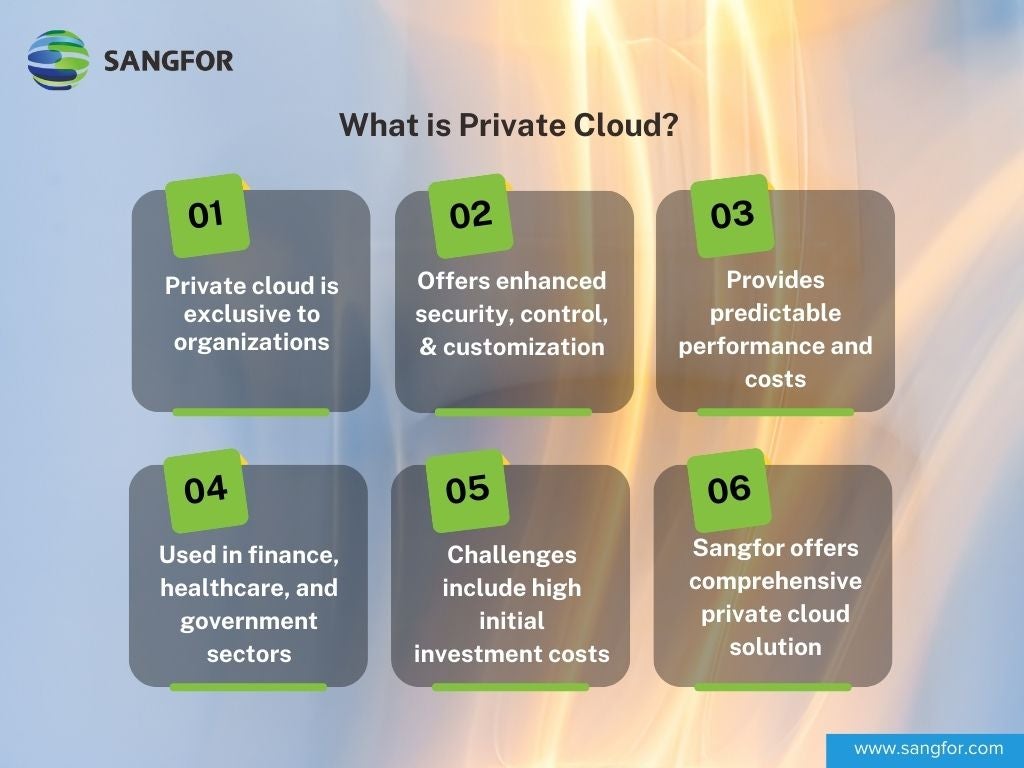Private cloud solutions offer numerous benefits for businesses seeking greater control, security, and flexibility in their IT infrastructure. By leveraging private cloud computing, organizations can tailor their environments to specific needs. In this glossary, we'll define what a private cloud is, explore its benefits, discuss types of private cloud, and examine how Sangfor's innovative solutions can empower your organization's digital transformation journey.

Private Cloud Definition
A private cloud is a type of cloud environment that is dedicated solely to one organization, making it a single-tenant environment. It provides enhanced security, control, and customization options compared to public cloud offerings. By leveraging virtualization technologies and virtual machines, private clouds enable businesses to create a scalable and agile IT infrastructure tailored to their specific requirements.

Understanding Private Cloud vs. Public Cloud
Private cloud computing solutions offer distinct advantages over public clouds, including enhanced security, compliance adherence, and performance optimization. Unlike public clouds, which serve multiple organizations, private clouds are designed for exclusive use by a single entity, operating as a single-tenant environment, ensuring greater control over data and resources.
Private Cloud Examples: Internal Private Cloud vs. Traditional On-Premise Data Center
Comparing an internal private cloud to a traditional on-premise data center reveals significant differences in architecture, management, and scalability.
- Architecture and Management. An internal private cloud is hosted on-site and managed solely by the organization. It employs cloud technology and virtualization for greater flexibility and efficiency compared to traditional data centers.
- Scalability and Efficiency. Internal private clouds excel in scalability, seamlessly expanding to meet increasing demands through automated provisioning and resource allocation. It eliminates the need for manual configuration or hardware upgrades.
- Self-Service and Accessibility. Internal private clouds empower users across departments with self-service capabilities. It reduces reliance on IT assistance and fosters innovation by streamlining workflows and resource management.
- Measurable Resource Allocation. Internal private clouds provide comprehensive visibility and control over resource utilization. It enables precise allocation and optimization through built-in monitoring tools for storage, bandwidth, and user activity, maximizing cost-effectiveness and performance.
Real-World Examples of Private Cloud
- Financial Institutions: Banks and financial services often use private clouds to securely manage sensitive customer data, transactions, and comply with strict regulatory requirements.
- Healthcare Providers: Hospitals and medical facilities leverage private clouds to store and process patient records, ensuring data privacy in compliance with HIPAA regulations.
- Government Agencies: Government organizations utilize private clouds to handle classified information, providing high security and control over data access.
- Large Enterprises: Corporations with substantial IT needs deploy private clouds to customize their infrastructure, enhance performance, and maintain control over proprietary applications.
Private Clouds, Hybrid Clouds, and Multi-Cloud Explained
Private cloud solutions are exclusively dedicated to one organization, offering enhanced security and control. In contrast, hybrid clouds combine private and public cloud elements. Hybrid clouds allow scalability while retaining sensitive data within a private cloud environment. They also facilitate integration with existing on-premises infrastructure.
To further deepen your understanding of the different cloud deployment models—including private cloud, public cloud and hybrid cloud—you might find this video helpful:
This informative video offers clear explanations of each cloud model, their key features, and how they compare to one another. It's an excellent resource to complement the definitions provided above.
Multi-Cloud Deployments
Multi-cloud involves using multiple public cloud platforms to meet diverse business needs. Unlike hybrid clouds, multi-cloud deployments exclusively rely on public cloud services from different providers, offering flexibility, redundancy, and vendor diversity to optimize performance.
Connectivity Cloud Integration
Connectivity cloud solutions enable seamless integration across diverse cloud deployments by facilitating interoperability and data exchange. They empower organizations to deploy applications and services effortlessly across private, public, and hybrid cloud infrastructures, ensuring agility, scalability, and efficiency while maintaining connectivity and data integrity.
Advantages of Using Private Clouds
Private clouds offer organizations unparalleled control, security, and predictability compared to traditional on-premises infrastructure and public cloud solutions. Here are some compelling reasons why organizations choose them:
- Enhanced Security. Private cloud environments, including the utilization of private cloud servers and virtual machines, provide heightened security measures by limiting access to the organization's own transactions. Unlike public cloud providers, which handle traffic from millions of users simultaneously, private clouds offer dedicated physical infrastructure. They enable organizations to exert greater control over server, network, and application security.
- Predictable Performance. With dedicated hardware resources and private cloud compute capabilities, they ensure predictable workload performance unaffected by other organizations sharing infrastructure or bandwidth. This predictability is crucial for maintaining optimal application performance and meeting service level agreements (SLAs) consistently.
- Long-Term Savings. Despite significant initial setup costs, private cloud infrastructure investment pays off over time. Organizations with existing hardware and network infrastructure achieve significant cost savings compared to recurring fees for public cloud services, maximizing ROI and financial sustainability.
- Predictable Costs. Public cloud costs are based on usage. Private cloud costs remain consistent each month, regardless of workload fluctuations or data transfer volumes. This predictability enables effective budgeting and avoids unexpected expenses.
- Regulatory Compliance. Private cloud solutions ensure compliance with regulations such as HIPAA , CCPA and GDPR, which mandates strict data residency and processing location requirements. Industries handling sensitive data rely on private cloud storage for complete control over information, mitigating compliance risks and ensuring data sovereignty.
Challenges of Private Cloud
While private cloud offers numerous benefits, oranizations may face certain challenges:
- High Initial Investment. Setting up a private cloud requires significant upfront costs for hardware, software, and skilled personnel. This investment can be substantial compared to the pay-as-you-go model of public clouds.
- Maintenance and Management Complexity. Managing a private cloud infrastructure demands specialized expertise to handle hardware maintenance, software updates, security protocols, and compliance requirements.
- Scalability Limitations. Although private clouds offer scalability, they may not match the virtually unlimited resources of public cloud providers without additional investment in infrastructure.
Understanding Private Cloud Architecture
Private cloud architecture involves consolidating resources within a data center to form a cohesive pool of resources. Through the addition of virtual machines and utilization of virtualization technologies, organizations can enhance the efficiency and utilization of their infrastructure.
Private Cloud Examples and Types
Private clouds offer diverse services and deployment models tailored to meet organizations' specific requirements:
- Infrastructure as a Service (IaaS). Private clouds host storage, networking, and computing services, providing organizations with scalable infrastructure resources.
- Platform as a Service (PaaS). Private clouds support PaaS applications, enabling organizations to seamlessly deploy and manage software applications.
- Virtual Private Cloud (VPC). A VPC is a private cloud instance hosted within a public cloud provider's infrastructure, offering enhanced flexibility and scalability.
- Hosted Private Cloud. Hosted by a cloud provider, this solution can be located on-premises or in a data center, offering dedicated resources and managed services.
- Managed Private Cloud. Managed by a third-party private cloud hosting partner, this solution delegates cloud management responsibilities, including hardware, software, networking, and operations.
Is a Private Cloud More Secure Than a Public Cloud?
The security of private cloud versus public cloud is a topic of debate. It depends on various factors and organizational priorities. While both private and public clouds offer security measures, the comparison often boils down to the level of control, customization, and risk tolerance of individual organizations. Let's delve deeper into the security aspects of each:
Private Cloud Security
- Control and Customization. Private clouds afford organizations greater control over security configurations and customization options. With dedicated physical infrastructure, organizations can implement tailored security measures to meet specific compliance requirements and governance mandates.
- Network Isolation. Private clouds are typically accessed through private, secure network links. It minimises exposure to external threats and unauthorized access. This network isolation adds an extra layer of security, particularly for sensitive data and critical workloads.
- Physical Security. Private clouds are confined to specific physical machines or data centers. Organizations can enforce stringent physical security measures to protect against unauthorized access or tampering.
Public Cloud Security
- Provider Security Measures. Public cloud providers invest heavily in security infrastructure and employ advanced security measures to protect customer data and infrastructure. Leading public cloud providers adhere to industry-standard security certifications and compliance frameworks to ensure data protection and privacy.
- Scalability and Redundancy. Public clouds offer scalable and redundant infrastructure. It enables organizations to leverage built-in redundancy and failover mechanisms for enhanced resilience against cyber threats and data loss.
- Shared Responsibility Model. While public cloud providers ensure the security of the underlying infrastructure, organizations are responsible for securing their applications, data, and user access within the cloud environment. Adhering to best practices for cloud security is essential to mitigate risks and safeguard sensitive information.
How Private Cloud Works?
Private cloud operates within a single-tenant environment, where all resources are exclusively accessible to one customer, ensuring isolated access and enhanced security. The workings can vary based on deployment models and management approaches:
Isolated Access
In a private cloud environment, all resources, including computing power, storage, and networking, are dedicated solely to one customer. This isolation ensures data privacy, security, and compliance with regulatory requirements.
Deployment Models
Private clouds can be deployed in various ways:
- On-Premises Deployment. Hosted within the customer's own data center, an on-premises private cloud offers complete control and customization over infrastructure and security policies.
- Hosted by Cloud Provider. Alternatively, private clouds can be hosted on an independent cloud provider's infrastructure. This approach offers the benefits of private cloud technology without the need for on-premises hardware maintenance.
- Offsite Data Center. Private clouds can also be built on rented infrastructure housed in an offsite data center. This option provides scalability and flexibility while outsourcing hardware management and maintenance.
Management Models
The management of a private cloud can be handled in different ways:
- Self-Managed: In a self-managed model, the customer assumes responsibility for the design, deployment, and maintenance of the infrastructure. This approach provides maximum control but requires expertise and resources to manage effectively.
- Managed by Service Provider: Alternatively, the management of a private cloud can be partially or fully outsourced to a service provider. Service providers offer managed services, including infrastructure monitoring, maintenance, and support, allowing organizations to focus on core business objectives.
Trends in Private Cloud
Staying abreast of current trends helps organizations leverage private cloud effectively:
- Integration with Artificial Intelligence (AI) and Machine Learning (ML): Enhancing automation and predictive analytics within private clouds.
- Edge Computing Integration: Combining private cloud resources with edge computing for real-time data processing closer to data sources.
- Containerization and Kubernetes: Implementing containers and orchestration tools for efficient application deployment and management.
- Increased Adoption of Software-Defined Technologies: Utilizing software-defined networking (SDN) and storage (SDS) to improve flexibility and scalability.
Sangfor's Private Cloud Solutions
At Sangfor, we understand the unique challenges businesses face in today's rapidly evolving digital landscape. Our cloud solutions empower organizations to build robust, scalable infrastructures that deliver unparalleled performance and reliability. With features such as hyper-converged infrastructure (HCI), Sangfor's private cloud offerings enable seamless integration, automation, and resource optimization.
- Sangfor HCI: Sangfor's Hyper-Converged Infrastructure (HCI) solution combines compute, storage, and networking resources into a single, integrated platform, streamlining deployment and management processes. By leveraging HCI technology, organizations can achieve greater agility, scalability, and cost-efficiency in their private cloud environments.
- Exploring Hybrid Cloud Deployments. Sangfor also supports hybrid cloud deployments, allowing businesses to seamlessly integrate on-premises infrastructure with public cloud services. This hybrid approach offers the flexibility to scale resources dynamically, optimize workload placement, and leverage the benefits of both private and public cloud environments.
- Enhancing Security in Private Cloud Environments. Security is a top priority in cloud deployments. Sangfor provides comprehensive solutions to safeguard sensitive data and critical workloads. With advanced encryption, authentication, and access control mechanisms, Sangfor helps mitigate security risks and ensure compliance with industry regulations.
- Leveraging the Benefits of Private Cloud. The benefits extend beyond enhanced security and control. It also offers greater customization options, performance optimization, and cost savings compared to traditional data center environments. By harnessing the power of the cloud technologies, businesses can drive innovation, accelerate growth, and stay ahead of the competition.
Frequently Asked Questions
Private cloud environments offer several benefits of private cloud, including enhanced security, control, and customization options. By consolidating resources within a dedicated infrastructure, organizations can optimize performance, scalability, and efficiency while maintaining data privacy and regulatory compliance.
Sangfor's Hyper-Converged Infrastructure (HCI) solution revolutionizes private cloud deployments by integrating compute, storage, and networking resources into a single, unified platform. By streamlining deployment and management processes, HCI empowers organizations to achieve greater agility, scalability, and cost-efficiency in their private cloud environments.
The main differences between private and public cloud solutions lie in ownership, access, and resource sharing. Private clouds are dedicated solely to one organization, offering exclusive access and control over resources, while public clouds serve multiple customers and share infrastructure resources. Private clouds provide enhanced security and customization options, while public clouds offer scalability, cost-effectiveness, and accessibility.
To ensure the security of their private cloud environments, organizations should implement comprehensive security measures, including network segmentation, encryption, access controls, and regular security audits. Additionally, organizations should stay vigilant against emerging threats, keep software and firmware up to date, and educate employees on best security practices.
Hybrid cloud integration allows organizations to seamlessly combine on-premises infrastructure, private cloud resources, and public cloud services, enabling flexibility, scalability, and resilience in IT environments. By leveraging hybrid cloud solutions, organizations can optimize resource utilization, reduce operational costs, and accelerate innovation while maintaining control over sensitive data and workloads.





